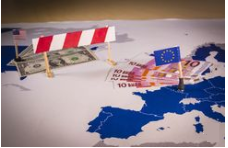By Amitrajeet A. Batabyal | July 26, 2018
Rochester Institute of Technology
 There appears to be a cease-fire in the trade war brewing between the U.S. and the European Union.
There appears to be a cease-fire in the trade war brewing between the U.S. and the European Union.
After a meeting at the White House between U.S. President Donald Trump and EU Commission President Jean-Claude Juncker, the two leaders declared a temporary truce to escalating trade tensions and agreed to begin negotiations to eliminate tariffs and subsidies on everything but cars. Juncker also agreed to buy billions of dollars more in U.S. soybeans and natural gas.
Since to some it seems like the U.S. got more than it gave in this tentative deal, it’s a good time to ask: Is Trump winning the trade war he began with Europe?
My research on international trade suggests that a good way to analyze what’s happening is not in terms of conflict but as a soccer match. Let’s say it’s halftime and the U.S. and EU are tied at 1-1. Who wins will depend most on the strategy each team works out in the locker room and how well it’s executed in the second half.
So let’s examine their game plans.
The lay of the pitch
Juncker’s visit was meant to cool the temperature and avoid the full-blown trade war the U.S. is already fighting with China.
The “game” began in March when Trump levied tariffs on imported steel and aluminum. The EU was initially granted an exemption that expired in May. The EU responded with its own tariffs on US$3.2 billion of U.S. imports. And Trump has since threatened to levy hefty tariffs on EU automobile imports.
For his part, Trump believes that the EU is a trade “foe” of the U.S. and that his tariffs are necessary and appropriate. The EU, naturally, disagrees, as evidenced by its complaint to the World Trade Organization.
The US side
A big advantage enjoyed by the U.S. is that it is able to make decisions quickly since there’s only one American president, while the EU has 28 leaders who all must agree to major decisions.
In addition, the U.S. runs a trade deficit with the EU, which means Americans buy more stuff from the Europeans than vice versa. Armed with these advantages, Trump’s strategy seems to be to use the threat of tariffs to create uncertainty, sow dissension within the EU and extract concessions.
Perhaps Trump thinks that because he can impose tariffs on more goods than the Europeans, the U.S. will win the game. He may also believe that his threat of steep tariffs on cars will compel Germany to force the EU to capitulate because Chancellor Angela Merkel won’t want to hurt her export-oriented auto industry.
While Trump somewhat effectively employed this strategy with South Korea, it may not work with the EU.
The EU’s divided union
That’s because the EU is no pushover.
The EU trades $3.7 trillion worth of goods and services with the rest of the world, four times more than South Korea and more than the United States’ $3.5 billion.
That said, the key problem in the EU is that different nations are displaying different levels of interest in a trade fight with Trump, making it hard to take advantage of its inherent economic heft and act in unison. As long as Germany is less interested in fighting this war than France because of the importance of its U.S. exports, the EU is hamstrung in its decision-making. This makes it more likely that it will yield to Trump’s demands. While some claim this is what happened in the July 25 meeting, I think the outcome was more like Juncker buying time in hopes of getting Merkel and French President Emmanuel Macron to unify over a common EU response.
If the EU manages to unite, however, the bloc could focus on becoming more competitive in other markets, such as China – where many American exports are now subject to tariffs – which would hurt the U.S. So there is an opening for the EU to sell goods to China that previously the Chinese would have bought from the U.S.
In other words, halftime is almost over, and the two teams will soon be on the field. Will Trump’s strategy of divide and conquer continue to work?
![]() A lot more is at stake in this game than a trophy and bragging rights. Nothing less than the rules-based international trading system – which has brought prosperity to much of the globe, including to both Americans and Europeans – may be on the line. Let’s hope we don’t have to go to penalty kicks.
A lot more is at stake in this game than a trophy and bragging rights. Nothing less than the rules-based international trading system – which has brought prosperity to much of the globe, including to both Americans and Europeans – may be on the line. Let’s hope we don’t have to go to penalty kicks.
Amitrajeet A. Batabyal, Arthur J. Gosnell Professor of Economics, Rochester Institute of Technology
This article was originally published on The Conversation. Read the original article.
